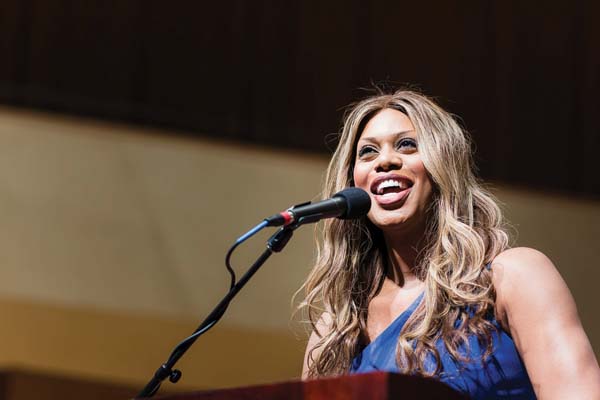Laverne Cox discusses transphobia, racism with hundreds at Northwestern

“Orange is the New Black” actress Laverne Cox talks about race, gender and sexual identity on Tuesday to a packed Pick-Staiger audience. As A&O’s spring speaker, the transgender LGBT advocate shared personal stories about discrimination.
April 29, 2015
Actress Laverne Cox described her path to overcoming transphobia, racism and sexism in her talk, “Ain’t I a Woman,” on Tuesday in front of a packed Pick-Staiger Concert Hall.
Cox, a transgender woman, spoke about her experiences with race, class, gender and sexuality to a crowd of about 1,000 at an event hosted by A&O Productions, One Book One Northwestern and Rainbow Alliance. Cox, who plays Sophia Burset on the Netflix show, “Orange is the New Black,” spoke at NU as part of her national tour. The talk was followed by a Q&A on topics such as diversity in entertainment and Cox’s own career.
Cox discussed the different parts of her identity, including forms of prejudice and oppression she faces. Racism and transphobia are regular occurrences for her in New York, she said, recounting incidents of transphobia, misogyny and racism and explaining the intersectionality of these experiences. Cox talked about the oppression transgender people, particularly transgender people of color, face from the police.
“We are revictimized by the police,” Cox said. “Far too often, the homicides of transgender people go unsolved. I can’t help but think about what’s happening in Baltimore. When a life is taken, someone has to be held accountable.”
Cox used the expressions cisnormative, heteronormative, imperialist, white supremacist and capitalist patriarchy to describe the intersecting oppressive forces in the United States and spoke about how these forces are embodied.
“Misgendering people is an act of violence,” Cox said. “Pronouns matter.”
Cox began her speech declaring, “I stand before you this evening a proud African-American, transgender artist,” Cox said. “It is important to claim the multiple components of my intersecting identity because I am not just one thing.”
Cox said the title of her talk, “Ain’t I a Woman,” comes from a speech by abolitionist and women’s rights activist Sojourner Truth in 1851, and is also the title of a book by feminist Gloria Jean Watkins, better known as bell hooks, a writer who inspired Cox.
Cox described her early life and the realization of her womanhood.
“One is not born a woman but rather becomes one,” Cox said quoting existentialist philosopher Simone de Beauvoir. “It is not guaranteed the one who becomes a woman is necessarily a female.”
Cox was born in Mobile, Alabama, to a working-class family with a single mother and twin brother. Her mother highly valued education and taught her and her brother about the history of racial oppression and resistance to that oppression in Alabama, Cox said.
She recounted stories of being bullied every day, chased home from school and being subject to homophobic slurs as a child for being too feminine.
“It was curious,” Cox said. “Antigay slurs were used against me, but it was really against my gender.”
Shame became a large part of Cox’s life, she said, as people told her something was inherently wrong with her. She differentiated shame from guilt, saying guilt is the belief she did wrong, but shame is the belief she is wrong. Cox spoke at length about shame and how it is ingrained in American culture.
Cox told the story of when she was in third grade and her teacher accosted her for holding a hand fan in a way seen as feminine.
“Your son is going to end up in New Orleans in a dress if we don’t get him in therapy right away,” Cox said her teacher told her mother.
Dance became a safe space for Cox, she said, and in third grade, she began dancing lessons. Inspired by the show “Fame,” set at a high school for the performing arts in New York City, Cox pursued her dancing at the Alabama School of Fine Arts.
Though the school was a positive experience because it allowed Cox to be independent from her mother, it was also where she first encountered racism and classism, adding more parts of her identity to her sources of shame, Cox said.
Cox eventually attended Marymount Manhattan College in New York City. Visiting clubs and meeting other transgender people allowed her to further discover her gender identity. She said she was often welcomed in night clubs, which finally gave her a sense of appreciation.
“New York City represented the space of ultimate possibility,” Cox said. “It was really the first time in my life my gender identity was celebrated.”
Cox ended the talk by describing difficult conversations she had with her mother that led to her mother’s acceptance of her womanhood and called on the audience to engage in these conversations.
“I would like to charge each and every one of you to have those difficult conversations, to create safe spaces to make mistakes,” Cox said. “Empathy is the antidote of shame.”
Medill junior Bo Suh and Weinberg sophomore Car Jansen, co-presidents of Rainbow Alliance, introduced Cox, listing her many achievements including being the the first openly trans actress to be nominated for a Primetime Emmy Award.
Organizers of the event said they were happy with the talk and high attendance.
“We were so excited to talk about a topic that doesn’t get brought up on a campus like Northwestern,” said Communication senior April Quioh, A&O’s director of speakers. “We’re excited to start fostering that conversation.”
Email: matthewchoi2018@u.northwestern.edu
Twitter: @matthewchoi2018


